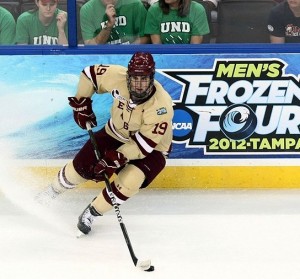
On the eve of their first round series with the Ottawa Senators, the Rangers signed Chris Kreider to a three-year entry level contract. Kreider, the Rangers 1st round pick in the 2009 NHL Entry Draft, has been the Rangers top prospect since he entered the organization. Rangers President and GM Glen Sather’s opinion of Kreider is so high that he refused to offer him in a trade this February for Columbus’ Rick Nash, and most likely nullified any deal that would have brought the Blue Jackets’ captain to New York.
In a roundabout way, the Rangers search for additional offensive help in the 2011-12 season and playoffs has now come full circle. The Rangers didn’t want to mortgage the future to bring a proven 30-goal scorer to New York in February, and after two months where they were in the middle of the pack in terms of goals per game, they decided to bring the future on board to solve the problem instead. It goes without saying that the Rangers are gambling by signing Kreider for the playoff run.
The first reason that this is a gamble is the effect it has on Kreider’s contract status going forward. Under the current CBA, any player signing their first professional contract is signed to a three-year contract. According to TSN’s Bob McKenzie, as soon as Kreider touches the ice in Tarrytown for the Rangers practice tomorrow, the first year of his entry level contract will be gone. Although Kreider has the potential to be a superstar in the NHL, it’s hard to believe that he will bring that much to the Rangers over their playoff run, and definitely not as much as he just provided to Boston College in winning the National Championship a few days ago.
In addition to what Kreider’s signing does to the entry level contract, there is no certainty about how he will respond to the NHL Playoffs without playing a single game of professional hockey, and under John Tortorella’s system with the Rangers. In an article in today’s New York Post, Larry Brooks talked about how three Rangers who have won a Stanley Cup (Brad Richards, Ruslan Fedotenko, and Mike Rupp) are beneficial in helping out players such as Michael Del Zotto and Carl Hagelin, who will both be playing in their first NHL playoff game on Thursday night, get ready for the postseason. In the article, Richards says, “No matter what I say, they have to get through it and experience the level and the pace the game gets to. We can talk about it all you want, but for the most part it’s the experience of getting your feet wet that means the most.” If what Richards says is true, and the only way a player like Del Zotto, who has played two and a half years of NHL hockey, can know what playoff hockey is like and be effective in it is through experience, then how quickly will Kreider, who hasn’t played a professional game yet, be able to adjust to it?
In John Tortorella’s system, players need to be able to skate and be well conditioned. Kreider’s speed and conditioning are among the best as far as NHL prospects, but transitioning from college hockey to the NHL has provided problems for players in the past. In his three years at Boston College, he played in 40, 32, and 44 games. In the Rangers recent history, 2009 Hobey Baker Award winner Matt Gilroy struggled towards the end of his first season with the Rangers because he was out of gas and had a hard time adjusting to Tortorella’s up-tempo system. If the Rangers play for another two months, which would most likely be somewhere between 20-25 games, will Kreider still have enough gas in the tank to play at the same level he was playing at for BC?
Finally, the other question is where Kreider will fit into the Rangers’ lineup. Since the Rangers have had scoring problems, and Kreider is an offensive player, it would seem that he would be suited best for the top two lines. For the Rangers, it is a Catch-22: If Kreider plays on the 3rd or 4th line (he will probably be on the 3rd line), then he isn’t going to get the offensive opportunities to do what he has done at BC, but if that is the case, then is it really worth burning a year off of his contract? On the other hand, if he is one of the top six forwards, then a player who has never played a professional game is apparently good enough right now to be on the top two lines for a team that won 51 games and is the #1 seed in the Eastern Conference.
Make no mistake about it, Chris Kreider will have his time to shine on Broadway. It just shouldn’t be the 2012 Playoffs.
Article: whoops.
Yep, the kid has proved me wrong the last three games.
Kreider is big, strong, and uber fast, none of which have much to do with experience. If he can keep from making epic mistakes his physical attributes alone will cause problems for other teams, much more than Mitchell ever could.